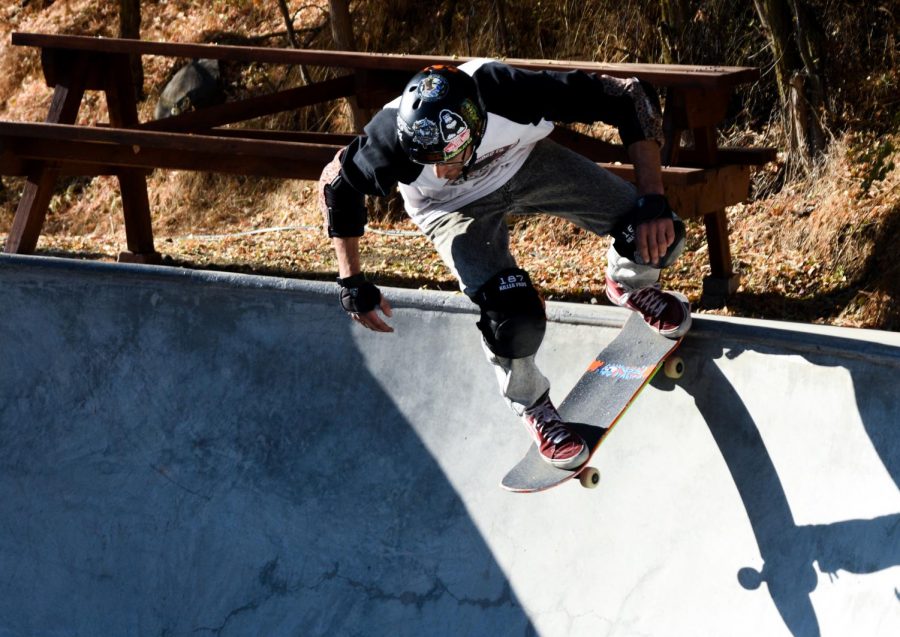Palouse farmer builds skate park
WSU alum received volunteer help, $15,000 grant from Tony Hawk Foundation for site
PAIGE CAMPBELL | THE DAILY EVERGREEN
Project leader Aaron Flandburg drops into the bowl on Friday at the Palouse Skatepark. The park experienced years of volunteer participation and received a $15,000 grant from the Tony Hawk Foundation.
October 25, 2018
For the past 17 years, a farmer in the town of Palouse has had a dream: to build a skate park.
Aaron Flansburg’s dream became a reality in June when the Palouse Skatepark officially opened in the town of Palouse, home to just 1,000 residents.
Michael Dahl, lifelong skater, farmer and best friend of Flansburg, helped build the park and design the bowl. He said the park is unique because it is one of the only parks in the nation that was entirely privately funded and built, but is open to the public.
“Between those two aspects, being private property and DIY, it’s on a real short list of parks worldwide especially of this quality,” Dahl said. “Then to have it in a town with a population of 1,000 is pretty monumental.”
The park was built by the nonprofit Palouse Skatepark Inc., which Flansburg started in 2010.
Flansburg said he tried to go the traditional route of getting a skate park built through the city for several years. He found he had public support but there was not a suitable city property available. It was not until a plot of land was donated by local community member Tony Kettel that Flansburg was able to get the project off the ground.
“In retrospect those were difficult times for the project, but it all turned out for the better,” he said. “We wound
up with a great facility and a great location that we wouldn’t have had otherwise.”
From there, Flansburg acquired a general contracting license for himself and hired a team of six professional builders in 2015 to build the main bowl. The rest of the 10,000-square-foot park was built by a team of volunteers entirely from donated money.
In March 2016, the park received a grant of $15,000 from the Tony Hawk Foundation. The nonprofit organization gives grants and resources to communities looking to build their first skate park.
“It was really a big boost to the project,” he said. “For a town this small to get $15,000 is really huge.”
Peter Whitley, the programs director at the Tony Hawk Foundation, said the largest grant the foundation gives is $25,000, but it only gives those grants to urban developments as a way to bolster other donations.
He said the foundation gave $15,000 to the Palouse Skatepark because they wanted to show their support for the project. It was the largest donation the foundation had ever given to a community that small.
Whitley said a typical skate park build will cost around $450,000. Flansburg built his with volunteer labor for about $69,000.
He said there are about 3,500 public skate parks in the U.S. and the Palouse Skatepark is one of about a dozen that is privately owned, open to the public and was volunteer-built.
Flansburg has lived in the Eastern Washington area his entire life. He was born in Pullman and graduated from WSU, but now lives in Palouse where he works on his family’s farm.
Flansburg said it may seem strange that he is a farmer who also loves to skateboard, but he believes his experience in construction from working on a farm helped in the process of building the park.
“Maybe it doesn’t make sense but there’s a lot of barns scattered around the country that have skate ramps in them,” he said. “I guess it’s not entirely uncommon but it might seem a little different.”
Dahl started skateboarding when he was in high school as well and has experience designing and building other parks, both private and public. Dahl said he fell in love with the culture of skateboarding. He likes the music and art, but also the community.
“If you skateboard then you give yourself to things like this,” he said. “You build ramps and you give back to the community.”
Both Dahl and Flansburg said they hope the park can be an outlet for kids in the community who need something to do. They said skateboarding majorly impacted their lives and they want to share that.
“I think there comes a point where it’s no longer a stick-to-it thing,” Dahl said. “It’s just your being. It’s who you are, it’s what you do.”









